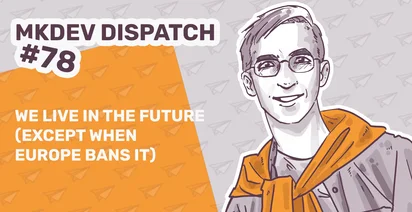We Live In the Future (Except When Europe Bans It) | ✉️ #78

Hey! 👋
You know, for the past week or so I’ve been feeling a certain frustration with European data protection laws. Normally, I support that approach – privacy, personal rights, all that… But the moments when it gets in the way of progress just drive me mad.
For many years, Apple presentations didn’t stir up much emotion in me. But the last one really got under my skin. Watching those new headphones translate speech from a foreign language in real time, it felt like the future had arrived! Suddenly I realized I could finally take driving lessons and pass the exam without any barrier.
See, in Serbia, driver training and the licensing exam are conducted exclusively in the official state language – that’s the law. And I’m still not confident enough in it. These new headphones would have solved that problem for me.
And then comes the news: that feature won’t be available in the EU because of data protection regulations. What the hell?! For once, the future is actually here – and Europe’s like, nope, not for us. I think the same fate awaits the new glasses from Meta. I find it hard to imagine how something that constantly films, listens, scans, and records could be approved in Europe. Unless it's a baby monitor :)
And it’s not just gadgets. Practically every innovation runs into the same wall of regulations: healthcare, artificial intelligence, cloud technologies. And the thing is, people like me often don’t even realize that something they’ve already planned for themselves, their company, their clients – just can’t be done, or can only be done with restrictions.
No wonder the startup landscape in Europe is so limited compared to the US. I spiral into despair, imagining that I will die long before the future arrives in Europe, and I’m honestly surprised that ChatGPT and Perplexity even work here at all. And then I remember Serbia isn’t in the EU yet, and I can breathe again. Time to check those preorder pages for the new headphones.
What We've Shared
- DevOps Accents, Episode 64: Chat GPT is making you dumber (not a clickbait, there is a research for that) Chat GPT affects yout ability to think critically! But does it actually make you “dumber,” or does it free up mental bandwidth for more meaningful work? Together with data scientist Paul Larsen, we unpack recent studies from Microsoft and MIT, real cases from software development and education, and translate it into practical rules: when it’s safe to delegate to AI and when you should deliberately “work the mental muscles” yourself (code review, testing, architectural decisions). We also touch on the org-level effect: what happens to a team’s skills if engineers become AI babysitters, and how to build proper model monitoring and evaluation instead of endless human-in-the-loop, and what companies can do to minimize risks.
- Before that we were talking to Suzanne El-Moursi (CEO & co-founder of Brighthive). She explains why the future of work is about velocity and efficiency, and why prompt engineering is the new English.
- Dockerless: Container Standards Landscape. Dockerless doesn’t end with OCI standards. In this final article we dive into CRI, CNI, CSI and tools like Kata Containers, showing how networking, storage and even lightweight virtual machines are shaping the future of container orchestration and cloud-native infrastructure.
What We've Discovered
- Understanding and Remediating Cold Starts: An AWS Lambda Perspective. Cold starts are the first thing you care about if you use Lambdas for synchronous workloads (like, http requests). This is a fresh and good guide on how and why they happen and how to reduce them.
- HTTP/2: The Sequel is Always Worse. In depth explanation of some of the security vulnerabilities of http/2 and what causes them, with examples exploiting Netflix and Atlassian.
The 79th mkdev dispatch will arrive on Friday, October 3rd. See you next time!
